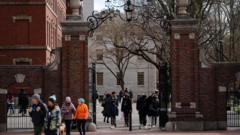The Trump administration has issued a staunch ultimatum to Harvard University, insisting on changes in hiring and admissions practices to combat rising antisemitism, or face severe repercussions, including a potential ban on foreign student enrollment.
**Trump Administration's Threat of Student Ban on Harvard: The Clash Over Campus Anti-Semitism**

**Trump Administration's Threat of Student Ban on Harvard: The Clash Over Campus Anti-Semitism**
The White House's new demands put Harvard's foreign student enrollment at risk while raising concerns over academic independence.
The ongoing tension between the Trump administration and Harvard University escalated this week as Homeland Security Secretary Kristi Noem threatened to ban the prestigious institution from enrolling foreign students. The White House's ultimatum followed Harvard's refusal to comply with a sweeping list of demands aimed at tackling antisemitism on campus.
With international students accounting for over 27% of Harvard’s enrollment in 2023, the stakes are high. President Alan Garber reiterated the university's commitment to independence and constitutional rights, refusing to yield to what he termed a government overreach.
The administration's approach characterizes Harvard as a potential threat to national security, with Noem asserting that the university must provide records regarding its foreign students allegedly involved in "illegal and violent" activities. Meanwhile, the Trump administration has frozen $2.2 billion in federal funds, with continued threats of additional financial repercussions looming.
Critics say this push reflects a broader agenda that has targeted educational institutions perceived to be hostile to conservative values. Trump's previous statements on educational reforms indicate a strategy focused on universities with a history of pro-Palestinian protests, which some Jewish students claim have left them feeling unsafe.
Harvard is not without its concessions; it has faced scrutiny over its handling of Middle Eastern studies, taking measures such as dismissing leaders under fire for lacking Israeli representation. However, it has not publicly addressed Noem’s latest demands, leaving the future of its foreign student enrollment in jeopardy.
With the administration's stance mirroring previous funding threats made against other institutions, such as Columbia University, where federal funds were rescinded unless compliance with demands was ensured, Harvard's resistance raises questions about the balance between maintaining academic freedom and responding to governmental pressure.
As this conflict unfolds, the fate of Harvard’s foreign student program hangs precariously in the balance while echoing broader debates on the role of universities in fostering diverse viewpoints amidst a politically charged atmosphere.






















